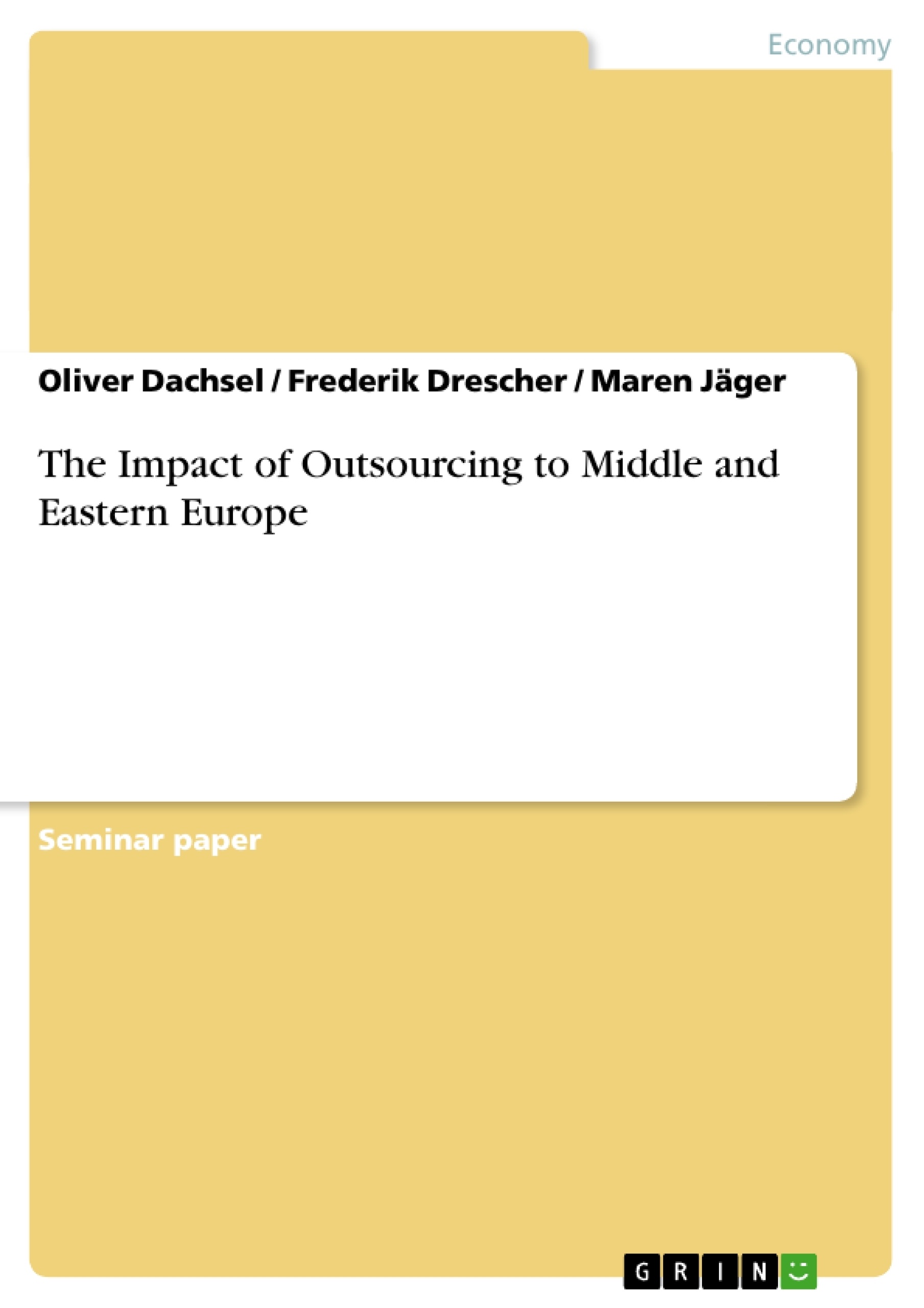Outsourcing is defined here as the geographical split-up of a firm’s value chain over national boundaries. It incorporates the procurement of intermediate inputs from a foreign location via imports that either takes place within a firm (intra-firm) or outside the firm in the form of arm’s length transactions (inter-firm). Thus outsourcing may (optionally) be accompanied by vertical foreign direct investment. The intermediate inputs receive a value-added in the outsourced stage of the value chain. Subsequently, they require final assembly upon their return to the outsourcing entity. Therefore the phenomenon of outsourcing can be clearly separated from buying raw materials and trading final goods. The paper proceeds as follows: Section 2 relates the characteristics of outsourcing to trade theory. Different theoretical frameworks predicting the effects of outsourcing on factor-prices are presented along with their central assumptions. Additionally, they are put into perspective with regard to a conventional Heckscher-Ohlin framework. In section 3 the model-outcomes are confronted with reality by reviewing relevant empirical studies in the context of outsourcing to Eastern European countries. The findings of the previous sections are then - in section 4 - transformed into suggestions for the political agenda dealing with the labor market challenges resulting from a further EU integration. Section 5, finally, concludes on central insights of the paper and indicates directions for further research.
Inhaltsverzeichnis (Table of Contents)
- Introduction
- Theoretical framework for the prediction of outsourcing effects
- Outsourcing as international trade in intermediate inputs
- Effects of outsourcing in conventional trade theory: the Heckscher-Ohlin model
- Characteristics of outsourcing to Eastern Europe and model assumptions
- New trade models focusing on outsourcing
- Feenstra and Hanson (1997)
- Arndt (1997)
- Kohler (2001)
- Dilemma of theory in explaining outsourcing effects
- Effects of outsourcing in an empirical perspective.
- Elements of an empirical analysis of outsourcing
- Labor market trends in Western Europe since 1990
- Magnitude and structure of outsourcing
- Size and direction of outsourcing effects
- Empirical links between outsourcing and the labor market
- Policy Implications
Zielsetzung und Themenschwerpunkte (Objectives and Key Themes)
This study aims to analyze the impact of outsourcing to Middle and Eastern Europe, providing a theoretical framework and empirical insights into the effects of this phenomenon. It explores how outsourcing affects labor markets, economic growth, and overall competitiveness.
- Theoretical foundations of outsourcing
- Impact of outsourcing on labor markets in Western Europe
- Empirical evidence of outsourcing effects
- Policy implications for managing outsourcing
- Economic consequences of outsourcing
Zusammenfassung der Kapitel (Chapter Summaries)
- Introduction: Introduces the topic of outsourcing to Middle and Eastern Europe and sets the context for the study. It highlights the importance of understanding the economic and social implications of this trend.
- Theoretical framework for the prediction of outsourcing effects: Examines the theoretical models that predict the impact of outsourcing, drawing from trade theory and international economics. It discusses the Heckscher-Ohlin model and newer models developed specifically for outsourcing, such as those by Feenstra and Hanson, Arndt, and Kohler.
- Effects of outsourcing in an empirical perspective: Analyzes the empirical evidence on the impact of outsourcing, considering data on labor markets, trade flows, and economic performance. It explores the magnitude and structure of outsourcing, and investigates the link between outsourcing and labor market outcomes.
- Policy Implications: Discusses the policy implications of outsourcing, considering measures to manage the potential risks and exploit the opportunities associated with this phenomenon. It explores strategies for mitigating job losses and enhancing competitiveness.
Schlüsselwörter (Keywords)
Key terms and topics addressed in the study include outsourcing, trade theory, Heckscher-Ohlin model, labor markets, Western Europe, Middle and Eastern Europe, economic growth, competitiveness, policy implications, empirical analysis, and international trade.
Frequently Asked Questions
How is outsourcing defined in this paper?
Outsourcing is defined as the geographical split-up of a firm’s value chain across national boundaries, involving the import of intermediate inputs from foreign locations, either within the firm or through inter-firm transactions.
What are the main theoretical models used to predict outsourcing effects?
The study reviews conventional trade theory (Heckscher-Ohlin model) and newer frameworks specifically focusing on outsourcing, such as those by Feenstra and Hanson (1997), Arndt (1997), and Kohler (2001).
What is the impact of outsourcing on Western European labor markets?
The paper analyzes labor market trends since 1990, exploring the link between outsourcing to Eastern Europe and changes in factor prices, employment levels, and the demand for different skill sets.
How does outsourcing differ from trading final goods?
Unlike trading final goods, outsourcing involves intermediate inputs that receive additional value-added in the foreign location and require final assembly upon return to the outsourcing entity.
What policy implications are suggested in the study?
The findings are used to propose suggestions for the political agenda to address labor market challenges resulting from further EU integration and the ongoing trend of international production splitting.
What is the role of Foreign Direct Investment (FDI) in outsourcing?
Outsourcing may optionally be accompanied by vertical foreign direct investment, where the firm owns the production facilities in the foreign country (intra-firm trade).
- Citation du texte
- Oliver Dachsel (Auteur), Frederik Drescher (Auteur), Maren Jäger (Auteur), 2006, The Impact of Outsourcing to Middle and Eastern Europe, Munich, GRIN Verlag, https://www.grin.com/document/56951



